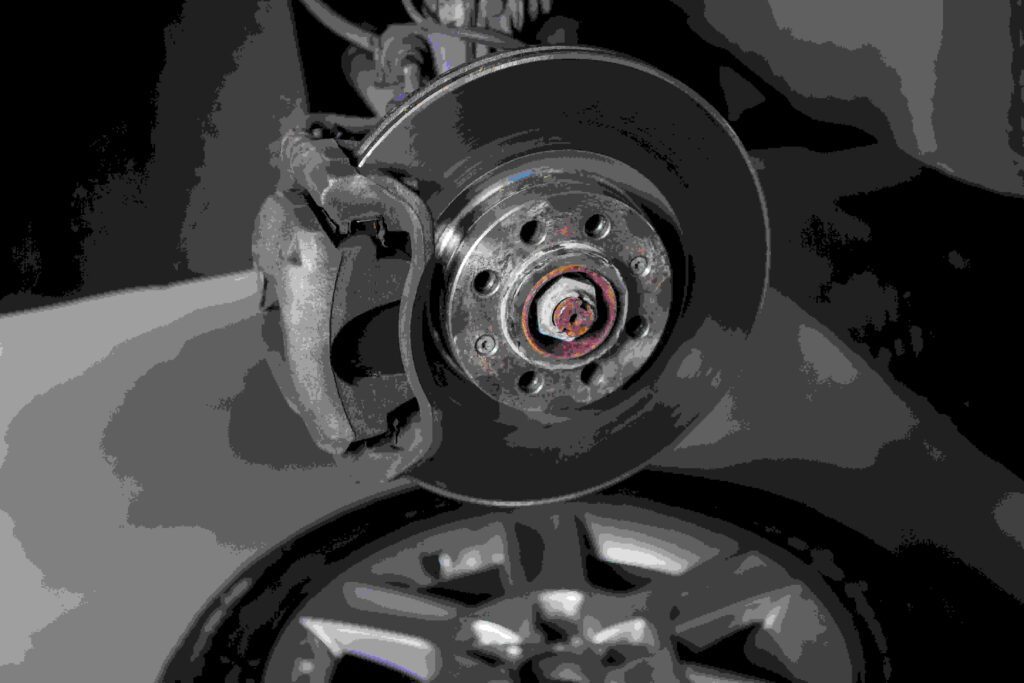
Are you experiencing a shaking sensation in your car when you apply the brakes? If so, this article is for you. Read on to know why your car shakes when braking and what you can do about it.
In this article, we’ll provide an overview of why your car may be shaking when braking and what steps you can take to fix it. We’ll cover common causes of this issue and how they can be diagnosed by a professional mechanic. Additionally, we’ll discuss preventative measures that can help keep your brakes in good working condition.
By reading this article thoroughly, you’ll gain a better understanding of why your car is shaking when braking and what steps you can take to address the issue. Whether you’re a seasoned driver or new to car maintenance, we believe everyone will benefit from the information presented here.
Car Shakes When Braking; Top Causes
Experiencing a shaky car is one of the most common problems facing car owners, especially when it comes to driving at high (above 50 mph) and low speeds. Fortunately, a little attention to your car’s maintenance can go a long way toward preventing this pesky issue. The next section of this article looks into eight causes of a car shaking at high or low speeds and provides practical solutions. By applying the advice provided, you can get your car back to running smoothly in no time.
8 Reasons Car Shakes in High Speed
1. Worn or Damaged Brake Pads: Brake pads provide a critical link between your car and the road, and they are constantly exposed to the effects of friction. Over time, this leads to wear and tear that can cause your brakes to shake, squeak, or even grind when braking at high speeds. Additionally, debris or foreign objects can become lodged in the brake pads, leading to a loss of traction and vibration. Replacing your brake pads is the simplest and most cost-effective solution for dealing with this type of problem.
2. Warped Rotors: Rotors are the circular plates that your brake pads clamp onto when you press down on the brakes, and they are an integral component of your car’s stopping system. Over time, the heat generated by the friction between the brake pads and the rotors can cause them to warp and cause a shaking sensation. Warped rotors can be identified by the presence of a ridged or uneven surface. The only way to fix this problem is to replace the warped rotor.
3. Brake Pad Vibration: In some cases, vibration can be caused by the brake pads themselves. Brake pads are typically made up of a metal backing plate, friction material, and springs. Over time, these materials can loosen, causing the pad to vibrate or become unevenly distributed when pressed against the rotors. Replacing the worn or damaged brake pads is the best solution for this type of problem.
4. Incorrect Brake Pad Installation: It is essential that you make sure the brake pads are correctly installed before you start driving. Poorly installed brake pads can lead to an inadequate transfer of force between the pad and the rotor, resulting in a vibration or shake that can be felt in the steering wheel and pedals. Make sure to check your brakes for any signs of improper installation.
5. Uneven Tire Pressure: Tire pressure affects the performance of your car, and uneven tire pressure can be one of the causes of brake shake. Uneven tire pressure can be caused by a number of factors, such as air leaks or an imbalanced wheel alignment. Checking and adjusting your tire pressure regularly can help prevent this issue.
6. Worn Suspension Components: The suspension of your car plays an important role in the overall handling of your vehicle, and worn suspension components can cause your car to shake at high speeds. Worn strut bearings, ball joints, and sway bar bushings can all cause vibrations that can be felt through the steering wheel. Replacing these components can help restore your car’s handling and reduce the shaking caused by suspension issues.
7. Out-of-Balance Wheels: If your wheels are not balanced, your car will vibrate at high speeds. Unbalanced wheels can be caused by a variety of factors, such as worn-out tires or excessive wear on one part of the wheel. Wheel balancing services are available at most auto repair shops and should be done regularly to ensure optimal performance.
8. Loose Brake Lines: The brake line is an essential component in operating your car’s braking system. Over time, these lines can become loose, which can cause the car to vibrate when braking at high speeds. It is important to check your brake lines periodically to make sure they are securely attached and that all of the connections are tight.
If your car is shaking when braking at high speeds, it is important to identify the source of the problem and take the necessary measures to address it. With the right knowledge and proper maintenance, you can restore your car’s smooth stopping performance.
8 Reasons Car Shakes at Low Speeds
Experiencing your car shaking or vibrating while driving at low speeds can be an unsettling and discomforting encounter. Here are eight possible reasons why your car shakes while driving at low speeds and how you can fix them.
1. Worn-out Tires: One of the most common reasons for car shaking is worn-out or unbalanced tires. If your tires are not properly inflated or have uneven tread wear, they can cause vibrations when in motion. The solution is to replace old tires with new ones and ensure they are correctly balanced and aligned.
2. Damaged Wheel Bearings: Wheel bearings are essential components that connect the wheel hub and axle shafts. When they become damaged, they can create a humming noise or vibration while driving. Replacing faulty wheel bearings is necessary to eliminate the shaking.
3. Faulty Suspension System: A faulty suspension system can result in excessive bouncing and shaking of the car while driving at low speeds. The solution is to have a professional mechanic inspect your vehicle’s suspension system for any worn-out parts, such as shocks, struts, or springs, that may require replacement.
4. Misaligned Wheels: Misaligned wheels can cause uneven tire wear and lead to vibrations while driving at low speeds. A wheel alignment service by a professional mechanic will correct misaligned wheels and eliminate shaking.
5. Brake Problems: Brake problems such as warped rotors, worn-out brake pads, or stuck calipers can cause vibrations when braking at low speeds. Replacing old brake pads with new ones, resurfacing warped rotors, or lubricating stuck calipers should help solve this problem.
6. Engine Issues: If there are problems with the engine mounts, spark plugs, or fuel injectors, the engine may vibrate excessively and create a shaking sensation in the car. The solution is to have a professional mechanic inspect your vehicle’s engine for any issues that may require repair or replacement.
7. Transmission Problems: Transmission problems like worn-out gears or fluid leaks can also cause shaking while driving at low speeds. A transmission service by a professional mechanic will correct these issues and eliminate shaking.
8. Loose or Damaged Parts: Loose or damaged parts such as tie rods, ball joints, or control arm bushings can lead to excessive movement of suspension components resulting in car shakes. Replacing loose or damaged parts by a professional mechanic will restore stability to your vehicle’s suspension system.
Car shaking while driving at low speeds could indicate significant issues that need urgent attention before causing further damage to your vehicle’s components.
It’s recommended always to seek professional help if you experience any unusual movements in your vehicle. Regular maintenance checks will help detect potential issues early on before they turn into costly repairs down the line. By addressing these eight possible causes of car shakes while driving at low speeds promptly, you’ll improve your safety on the road and prevent further damage to your vehicle’s components
Car Shaking When Braking: Possible Solutions and Costs
Experiencing car shaking when braking can be worrisome and may signify a larger issue with your vehicle. Identifying and resolving the root cause of the problem is essential in keeping you safe on the road. Here are some possible solutions to fixing car shaking when braking, along with the costs associated with each.
Solution 1: Replace Brake Pads and Rotors
One of the most common causes of car shaking when braking is worn-out brake pads. Replacing them along with your rotors can help restore your vehicle’s performance and eliminate any vibrations caused by standard wear and tear over time. The cost for this solution depends on the type of pad and rotor you choose, but expect to pay about $250 to $500 for the parts alone.
Solution 2: Check Wheel Bearings
If your brake pads are still in good shape, it might be worth inspecting your wheel bearings for wear or damage. Faulty bearings can also cause your car to shake when braking, so having both checked can help identify any underlying problems quickly. Replacement wheel bearings usually cost around $100 to $300 per bearing, depending on the make and model.
Solution 3: Align Wheels
Wheels that are out of alignment will cause pulling symptoms that can often feel like car shakes when braking. Make sure to check the alignment of all four wheels before attempting any other repairs, as this is by far one of the most affordable solutions to consider $50 to $100.
By understanding these solutions and their associated costs, you’ll be better equipped to diagnose and resolve any problems related to car shaking when braking promptly and efficiently without breaking the bank.
Final Words
In conclusion, experiencing a car shake when braking is a common issue faced by many drivers, but it’s essential to address it promptly for safety and optimal vehicle performance. This article has provided valuable insights into the possible reasons for car shaking while braking at both high and low speeds, along with practical solutions for each problem.
From worn brake pads and warped rotors to misaligned wheels and loose brake lines, various factors can contribute to the shaking sensation. By diagnosing the problem correctly and seeking professional help, drivers can ensure the root cause is identified and effectively resolved. Regular maintenance checks, including tire inspections, suspension evaluations, and alignment services, can also prevent car shaking from occurring in the first place.
Finally, for reliable diagnosis, fixing, and preventative care, HEART Auto Care offers the expertise and top-notch services to keep vehicles running smoothly and safely on the road. Through comprehensive inspections, efficient repairs, and regular maintenance, HEART Auto Care provides drivers with the peace of mind they need to confidently drive their cars.
Remember, addressing car shaking when braking promptly and proactively maintaining your vehicle can lead to a smooth and enjoyable driving experience while ensuring the safety of both you and your passengers. So, if you’re experiencing car shaking when braking or any other automotive issues, don’t hesitate to seek professional assistance and keep your ride running at its best.






